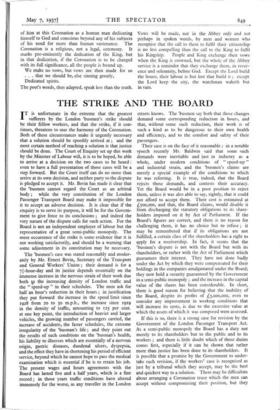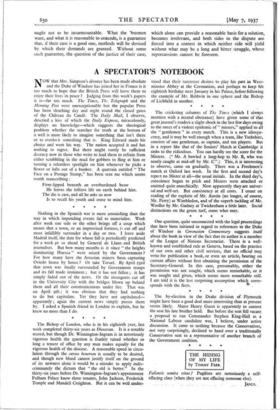THE STRIKE AND THE BOARD I T is unfortunate in the
extreme that the greatest sufferers by the London 'busmen's strike should be their fellow workers, and that the strike, if it con- tinues, threatens to mar the harmony of the Coronation. Both of these circumstances make it urgently necessary that a solution should be speedily arrived at ; and the most certain method of reaching a solution is that justice should be done. The Court of Enquiry set up this week by the Minister of Labour will, it is to be hoped, be able to arrive at a decision on the two cases to be heard : even to have a full presentation of those cases will be a step forward. But the Court itself can do no more than arrive at its own decision, and neither party to the dispute is pledged to accept it. Mr. Bevin has made it clear that the 'busmen cannot regard the Court as an arbitral body ; while the very constitution of the London Passenger Transport Board may make it impossible for it to accept an adverse decision. It is clear that if the enquiry is- to serve its purpose, it will be for the Govern- ment to give force to its conclusions ; and indeed the very nature of the dispute calls for such action. For the Board is not an independent employer of labour but the representative of a great semi-public monopoly. The mere occurrence of the strike is some evidence that it is not working satisfactorily, and should be a warning that some adjustment in its constitution may be necessary.
The 'busmen's case was stated reasonably and moder- ately by Mr. Ernest Bevin, Secretary of the Transport and General Workers' Union ; their demand is for a 71-hour-day and its justice depends essentially on the immense increase in the nervous strain of their work due both u) the increasing density of London traffic and the " speed-up " in their schedules. The men ask for half an hour's reduction in their hours ; in justification they put forward the increase in the speed limit since 1928 from 20 to 30 m.p.h., the increase since 1919 in the density of traffic, amounting to 125 per cent. at one key point, the introduction of heavier and larger vehicles, the growing number of passengers carried, the increase of accidents, the faster schedules, the extreme irregularity of the 'busman's life ; and they point out the results of such conditions on the 'busman's health, his liability to illnesses which are essentially of a nervous origin, gastric diseases, duodenal ulcers, dyspepsia, and the effect they have in shortening his period of efficient service, beyond which he cannot hope to pass the medical examination which is essential if he is to retain his job. The present wages and hours agreements with the Board has lasted five and a half years, which is a fine record ; in those years traffic conditions have altered immensely for the worse, as any traveller in the London streets knows. The 'busmen say both that those changes demand some corresponding reduction in hours, and that, without some such reduction, their work is of such a kind as to be dangerous to their own health and efficiency, and to the comfort and safety of their passengers.
Their case is on the face of it reasonable ; in a notable speech recently Mr. Baldwin said that some such demands were inevitable and just in industry as a whole, under modern conditions of " speed-up " and industrial strain, and the 'busmen's claims are merely a special example of the conditions to which he was referring. It is true, indeed, that the Board rejects those demands, and contests their accuracy. Yet the Board would be in a poor position to reject them, unless it was also able to say, rightly, that it could not afford to accept them. Their cost is estimated at koo,000, and that, the Board claims, would disable it from discharging the statutory obligations to its share- holders imposed on it by Act of Parliament. If the Board's figures are correct, and there is no reason for challenging them, it has no choice but to refuse ; it may be remembered that if its obligations are not fulfilled, a certain class of the shareholders has a right to apply for a receivership. In fact, it seems that the 'busmen's dispute is not with the Board but with its shareholders, or rather with the Act of Parliament which guarantees their interest. They have not done badly under the Act by which they were compensated for their holdings in the companies amalgamated under the Board; they now hold a security guaranteed by the Government in a semi-public monopoly ; and the increase in the capital value of the shares has been considerable. In short, there is good reason for believing that the inability of the Board, despite its profits of L5,00o,00o, even to consider any improvement in working conditions that will increase its costs, is due to the excessive value at which the assets of which it was composed were assessed.
If this is so, there is a strong case for revision by the Government of the London Passenger Transport Act. As a semi-public monopoly the Board has a duty not merely to its shareholders but to the public and to its workers ; and there is little doubt which of those duties comes first, especially if it can be shown that rather more than justice has been done to its shareholders. It is possible that a promise by the Government to under- take such revision, if the workers' case is recognised as just by a tribunal which they accept, may be the best and quickest way to a solution. There may be difficulties about arranging a Coronation truce which the men can accept without compromising their position, but they ought not to be insurmountable. What the 'busmen want, and what it is reasonable to concede, is a guarantee that, if their case is a good one, methods will be devised by which their demands are granted. Without some such guarantee, the question of the justice of their case, which alone can provide a reasonable basis for a solution, becomes irrelevant, and both sides to. the dispute are forced into a contest in which neither side will yield without what may be a long and bitter struggle, whose repercussions cannot be foreseen.















































 Previous page
Previous page